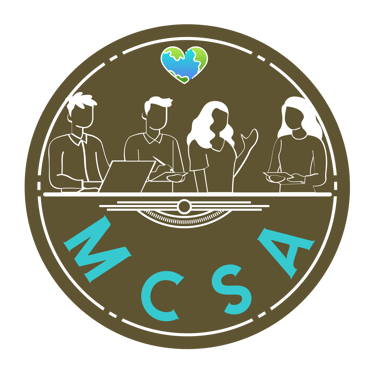
Hello Migrant Citizen Scientists of Europe!
The Migrants Citizen Science Association (MCSA), a non-governmental organization, held its first hybrid meeting on April 28, 2023, in Norway, Germany, and the Netherlands. The core group, founders, project leaders, and advisory board members discussed the importance of migrants' inclusion in scientific research and citizen science activities. The group aims to promote equality, diversity, and just societies by shifting the conventional Eurocentric, Western-centered, and androcentric model and framework dominating scientific investigations. The MCSA plans to educate and encourage migrant participation in citizen science activities, which can enrich the existing pool of knowledge with their unique backgrounds and experiences. The inclusion of migrants as stakeholders in scientific research projects is crucial.


We envision a paradigm shift where we see the inclusion of and collaboration with migrants in the scientific research process to promote equality, diversity, and a just society. It might sound like an enormous task but is historically doable.
This was central to the discussion when the MCSA (Migrants Citizen Science Association) core group convened for the first time in a hybrid (online and in-person) meeting on Friday afternoon, 28 April 2023.
The core group—with the founders, project leaders, and advisory board members based in Norway, Germany, and the Netherlands—agreed on the urgency to reform the conventional ways that shape the Eurocentric, Western-centered, and androcentric model and framework dominating scientific investigations. That is, without the inclusion of migrants who comprise a significant portion of populations throughout Europe, research outcomes will neither be truly scientific nor will they be of significant value to a mixed populace.
Co-founder Jones K. Adom Danquah kicked off the meeting by narrating how the idea of founding a non-governmental organization that caters to migrants’ participation in citizen science arose.
He said that the exclusion of migrants is not limited to scientific research alone. Rather, it is likewise common in academic discourse. Danquah stressed that “for policies that affect a society, everyone (not only the native white population) should be on board… regardless of race, ethnicity, and religious background.”
Founder Love Gonzales Malundo then continued on to describe the several ways the organization can add knowledge to the scientific community through citizen science. She said that migrants can enrich the existing pool of knowledge with their various backgrounds and come forth with data unique to their experiences as well as their lands of origin.
The first of these activities would be to educate participating community members on how to conduct scientific research through training, seminars, lectures, etc. This is not as complicated as it sounds. In fact, each one of us has likely applied the scientific habit of questioning our observations in everyday situations and seeking evidence. Trivial examples would be exploring what's causing that creaking sound on your door, or why crackers lose crispness when exposed to air.
Malundo added that enjoining migrants in the research process can be empowering as it makes them conscious of issues that directly impact their daily living and amplifies their voices toward policymaking, addressing the gap between science and society.
The Crucial Role of Citizen Science in Open Science
Prof. Rose Bernabe, PhD of the University of Oslo, an MCSA Advisory Board member, who is an expert in the open science field made a distinction between participatory research and citizen science. She said when the general population—including the ethnic minority and migrant population—participate in citizen science, then they are not merely the data sources being the research respondents (as in participatory research), but the researchers themselves, akin to junior scientists.
She also emphasized that the call for citizen science is gaining traction throughout European universities which now even offer academic units exclusive for its study.
Prof. Bernabe cited development research as an example of how excluding migrants gravely affects knowledge formation. She said that under-representing or excluding migrants in the process would leave a big hole in research outcomes. It, thereby, undermines its representativeness to a population and scientific validity to an extent.
The inclusion of migrants as stakeholders in scientific research projects is, therefore, crucial if we in Europe were to achieve equitable and just societies.
Future Activities and Events
The core group also discussed future activities that would encourage the active participation of citizen scientists among the stakeholders, ensuring migrants are not left out. Dr. Divina Gracia P. Rodriguez, PhD, also a member of the MCSA Advisory Board, found the vision insightful and mentioned including migrants in her own current and future research projects as well.
MCSA has also planned to conduct training and seminars to educate citizens on how to conduct scientific research, with the end goal of having an inclusive scientific process. Community events will also soon be held. Reina Regis, a MCSA project leader based in Germany, added that MCSA can potentially establish a path for migrants' participation in various avenues, which would put them closer to the community.
Who are the Migrants?
Ging Ledesma, PhD, one of the three advisory board members, raised the question: just who are the migrants? Malundo made the clarification that MCSA does not discriminate between undocumented and documented migrants. In addition to involving migrants and citizens in the scientific research process, MCSA recognizes the difficulty migrants face in integrating into society. Involving and collaborating with them through citizen science activities might prove helpful in facilitating their integration, reinforcement of their rights, as well as an understanding of different circumstances that are grounded. Macel Ingles, one of MCSA’s project leaders also added her reflection towards living as a migrant in Norway and the urgency of migrants advocacy.
Connect with us
If you would like to be informed and/or join future community events by MCSA, download from our open-source database, or be updated on developments in citizen science and open science, feel free to subscribe to our newsletter or follow us on social media via the links below.

